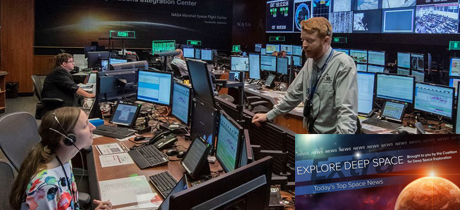In Today’s Deep Space Extra… You’re invited to fly your name around the Moon on Artemis I. The global space community continues to assess and respond to Russia’s military incursion into Ukraine. Despite the tensions, NASA says operations aboard the seven-person International Space Station are continuing as normal.
Human Space Exploration
Your name can fly around the Moon on NASA’s Artemis I mission
Space.com (3/3): NASA is inviting people to fly their names around the Moon on the agency’s Artemis I mission. Coming aboard in this manner is easy and free; just click the “get boarding pass” button at this NASA page. Artemis I is the first integrated flight test of the Space Launch System (SLS) rocket and Orion spacecraft, and paves the way for the first human landing on the Moon since the Apollo program.
Other News
Rogozin takes aim at space cooperation with U.S., Europe, Including ISS
Spacepolicyonline.com (3/2): Dmitry Rogozin, head of Roscosmos, Russia’s space agency, continued to lash out over sanctions imposed against Russia over its military intrusion into Ukraine. On Wednesday, he warned that a Soyuz launch of OneWeb communications satellites planned for Friday from the Baikonur Cosmodrome was being cancelled unless the U.K. divests its partial ownership of the company. Rogozin also repeated threats to end the country’s partnership in the International Space Station (ISS), which is currently staffed by three cosmonauts and four NASA and European Space Agency (ESA) astronauts. NASA continues to describe day to day ISS operations as sound. Rogozin’s threats to block future international cooperation on the space front could take a financial toll on its commercial rocket launch services. OneWeb directed its staff to leave the Baikonur Cosmodrome in Kazakhstan, a Russian asset, halting efforts to carry out a launch on Friday of a number of small OneWeb satellites on a Soyuz rocket.
NASA in Huntsville working ‘as normal’ with Russians on Space Station
Huntsville Times (3/2): NASA’s Marshall Space Flight Center is home to the International Space Station’s (ISS) payload operations center, which coordinates much of the science activity underway aboard the seven-person orbital laboratory. An agency spokesperson offered assurances that operations are continuing normally despite global tensions surrounding Russia’s military incursion into Ukraine. More than 1,000 government and contract personnel support ISS operations from Marshall.
Russian sanctions throw South Korean satellite missions into uncertainty
SpaceNews.com (3/2): Sanctions imposed on Russia for its incursion into Ukraine could disrupt efforts by South Korea to launch a pair of satellites on Russian rockets this year. They are the CAS500-2 remote sensing satellite and the Komsat-6 multi mission satellite that includes synthetic aperture radar for Earth observations. At least for the moment, preparations continue, but South Korean officials acknowledge an unwanted delay is possible.
Satellite photos show Iran had another failed space launch
Coalition Member in the News – Maxar
APnews.com (3/3): Satellite images provided by Maxar Technologies reveal an apparent rocket launch failure by Iran. Additional images from Planet Labs PBC suggest the failure likely occurred after last Friday. A spokesman for the U.S. Space Command says a weekend launch was not detected, suggesting the failure occurred on the pad. The pad shows evidence of damage in the satellite imagery.
Scientists gearing up for rocket body’s March 4 Moon crash
Space.com (3/2): Friday will mark the impact of a rocket stage at the Moon, an event that will be a focus of observations by NASA’s Lunar Reconnaissance Orbiter (LRO) and Earth based telescopes. The impact is forecast for the Moon’s far side early Friday, a first involving a strike from space junk with an Earthly origin. The impactor is believed to be the upper stage of a Chinese rocket.
You can watch an asteroid zoom safely by Earth in a live webcast today
Space.com (3/3): A large asteroid will safely fly by Earth today (March 3), and you can watch it live online. The Virtual Telescope Project is planning to stream live telescope views of the asteroid 138971 (2001 CB21) during its approach. Technically classified as “potentially hazardous,” the asteroid isn’t really cause for concern. It will pass by at the equivalent of nearly 13 times the average Earth-moon distance (3 million miles, or 4.9 million kilometers), according to the Center for Near-Earth Object Studies (CNEOS) managed by NASA’s Jet Propulsion Laboratory (JPL). The Virtual Telescope Project’s event starts at 10 p.m. EST.

